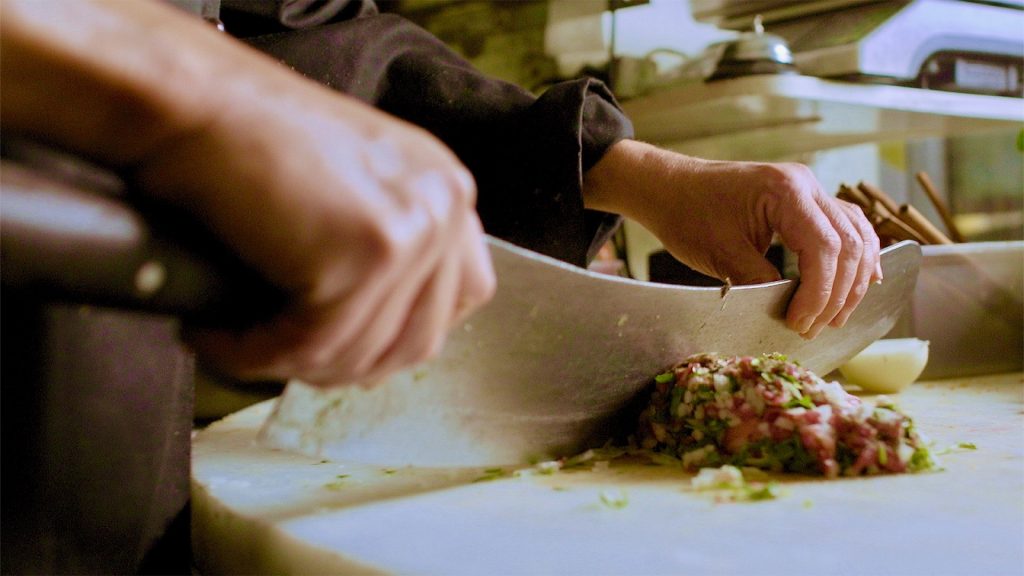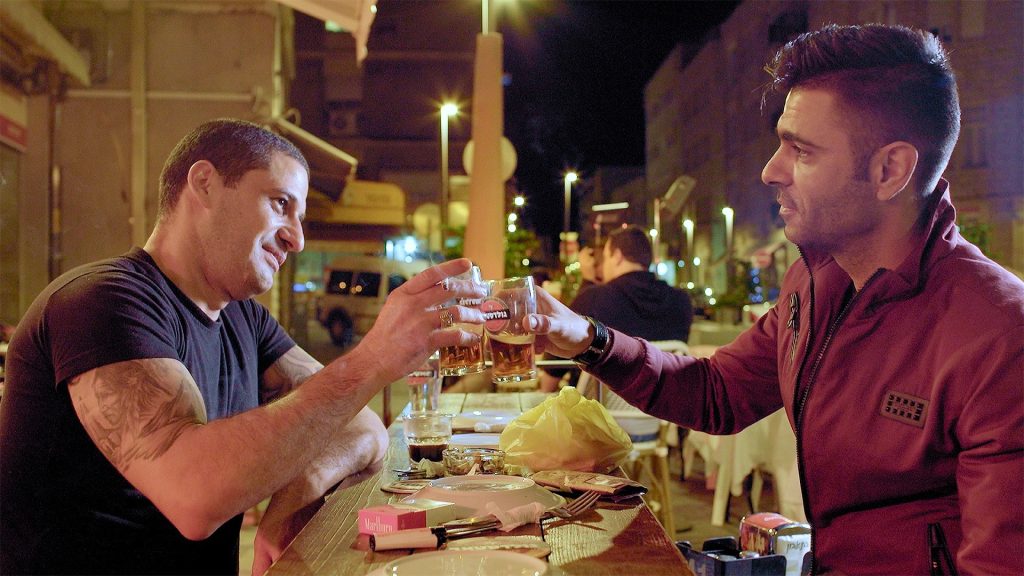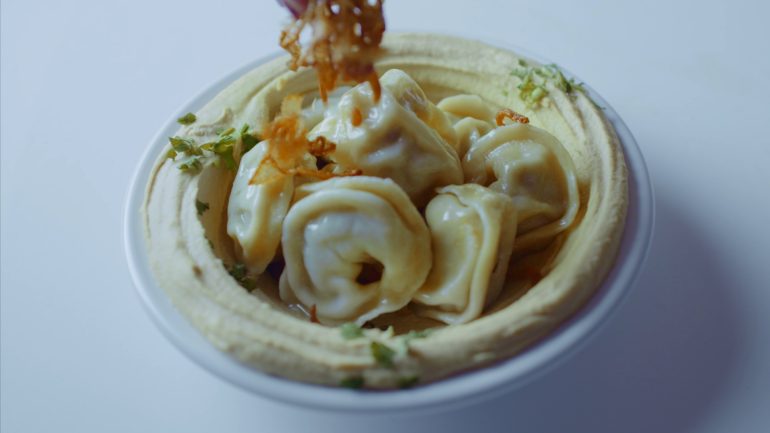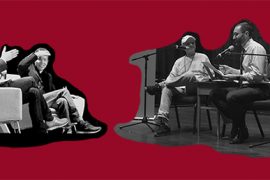At the start of “Breaking Bread,” an award winning film making rounds at international film festivals, Dr. Nof Atamna-Ismaeel describes her intersectional identities: “I am a Muslim, I am an Arab and Israeli, I am a Palestinian, I am a woman, I am a scientist, I am a cook.” The first Arab Israeli to win popular TV cooking competition “Master Chef Israel,” Nof aims to use her platform to create a bridge between Arabs and Jews in her country using cross cultural menus and workspaces. The celebrity chef’s A-Sham Arab Food Festival takes place in Haifa, the third largest city in Israel. Haifa has a reputation for cultural diversity and integration, and although many residential districts there are customarily segregated, the community prides itself on intercultural connection. “Breaking Bread” focuses on the 2019 A-Sham festival, the third year Nof had organized the event. The film is mostly chefs monologuing or cooking, interspersed with sensual, slow motion close up shots of food being plated. Director Beth Elise Hawk does a good job of presenting beautiful food without feeling pretentious. From internationally ubiquitous hummus to hyperlocal specialties like octopus maqluba from the city of Akka, the dishes serve as a foundation for sharing family stories, personalities, and hopes for friendship between Israelis of all backgrounds.

The film deliberately avoids controversial political subjects. The overarching philosophy is explicit, from the opening quote attributed to Anthony Bourdain, “Food may not be the answer to world peace…but it’s a start.” Atamna-Ismaeel later reiterates, “When someone eats your food, that’s where politics end.” Ilan Ferron, a non-religious Israeli chef of French Catholic, Jewish and Muslim descent, considers focus on borders, history, and demagoguery the stumbling blocks to establishing regional political power with neighboring nations. Successful Tel Aviv restaurateur Osama Dalal, with his deep family roots in the Mediterranean port city of Akka, prioritizes the connection to the landscape and resources themselves. Overwhelmingly, the narrative of the film is that most Israelis want to get along and not worry about conflicts that divide them. In a larger political context, this feels simplistic and avoidant, but interpersonally, it’s hard to hate people enthusiastically sharing culture with the folks around them.
In an interview with PBS, Bourdain claimed to be thinking of his friend Ted Nugent when he said, “Food may not be the answer to world peace, but it’s a start.” He explained, “I find almost everything that comes out of his mouth to be violently offensive. But we both like barbeque.” The lack of stakes that white affluence and artistic celebrity afford Bourdain and Nugent to find common ground without being forced to consider the consequences of “violently offensive” speech is on full display. Arguably, it also provides the kind of distance that diplomats, intellectuals, and artists alike use to imagine new perspectives and possibilities for conflict resolution. The use of Bourdain’s quote to ground the movie from the get go alludes to the position of the filmmakers on this point.
The profiles are intimate; chefs are referred to by their first names, and many speak extensively about their family histories in Israel, why they are proud to be Israeli, and the unmitigated necessity for friendship between Arab and Jewish Israelis. Nof organizes the festival by assigning chefs from all over Israel to 35 Haifa Restaurants, where they work as a team with a cross cultural chef to recreate an Arab dish that Nof helps choose. Whether the recipes chosen are to highlight Arab fare that Jewish Israelis are unlikely to be familiar with, or common plates of culinary syncretism, the chefs in the film are sweetly devoted to the language of food. Shlomi and Ali are standout examples of Nof’s goals for the festival and the tone of the documentary; the men discover shared roots, a respect for each other’s culinary skills, and genuine friendship.

Shlomi Meir is a third generation Israeli restaurateur who specializes in the Eastern European recipes of his grandfather. He dedicates his life to his sisters, his father, and the cadre of motherly figures who work in his Haifa kitchen. As long as he can cook in his restaurant, he’s
happy. “Give me bread, water and Marlboro. That’s it,” he claims. Ali Khattib is a Muslim Arab personal chef from the famously divided city of Ghajar, which is situated between Israeli occupied Golan Heights, Syria, and Lebanon. The people there identify as ethnically Syrian and voted to be part of Israel rather than Lebanon in the 1980s, to put a very abbreviated gloss on things. Ali praises the opportunities available to him as an Israeli and devotes himself to bringing traditional Syrian cooking from Ghajar to modern Arab and Jewish Israelis alike. Both men are adorable in their sincerity about delicious food. When Shlomi (whose mother was Egyptian) talks about the old fashioned Arab food he makes for himself at home, Ali’s eyes light up, just as Shlomi’s do when he tastes the dry Kishek that Ali’s grandmother sent with him. (Kishek is a sun dried bulgur and yogurt soup starter.) After service ended, Ali gushed, “He made it better than me! …But not Grandma!”
This film is a loving, if not in depth, look at patriotic, multiethnic Israelis adapting to a political conflict they seem to conceive of as out of their hands. The subjects of the film sincerely believe in promoting unifying, cross cultural traditions. Equally, it’s premised by the claim that 90% of the people in Israel’s territory want to be peaceful Israeli citizens, dismissing the agitations of “10%” who don’t. I recommend the film for the culinarily curious, and as a starting point for discussions about everything from domestic labor to hummus to the legacy of Yitzhak Rabin. To see how you can watch “Breaking Bread,” check out https://cohenmedia.net/product/breaking-bread.





